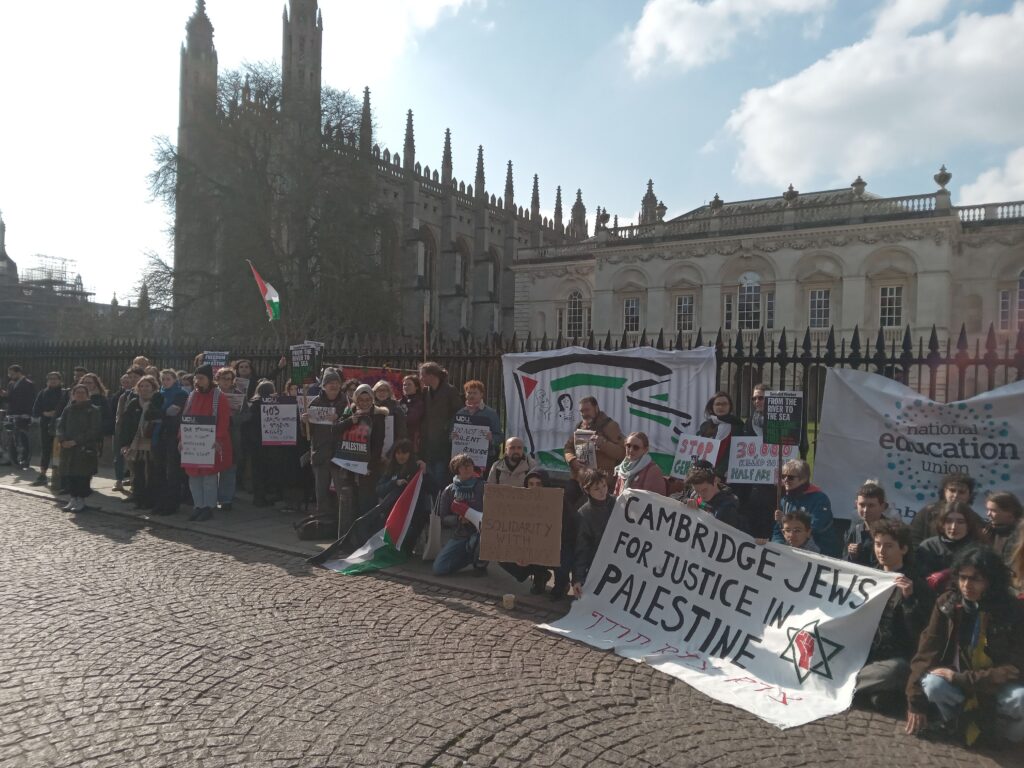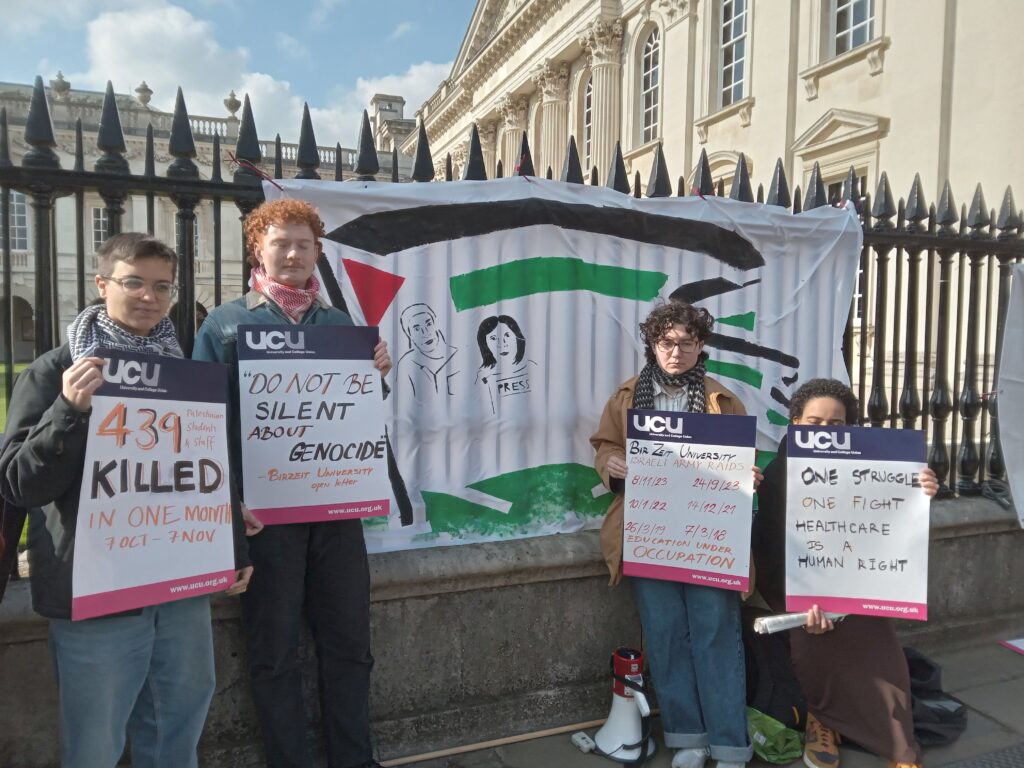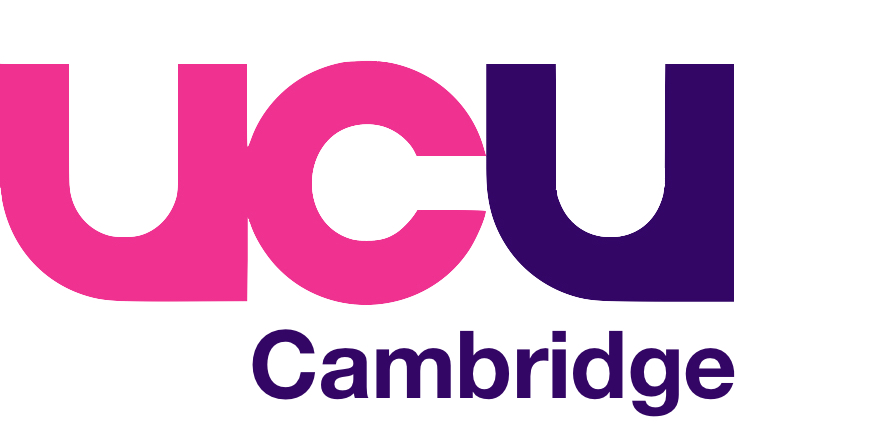
On international women’s day we organised a rally jointly with Cambridgeshire NEU in solidarity with Palestinian women as part of a national day of action calling for a ceasefire and an end to occupation and apartheid. Around 100 people took part including staff, students and local activists.
We have gathered here the speeches made on the day by our speakers and the testimonies we read out about Palestinian women’s experiences across different generations.
Maryam, Cambridge Palestine Society
It shouldn’t need to be International Women’s Day for me to remind you that your feminism means NOTHING if you don’t realize that none of us are free until ALL of us are free.
Until women EVERYWHERE can live in safety, freedom and dignity on their own lands.
And yet here we are, on International Women’s Day 2024, where as I speak girls and women in Gaza are entering their sixth month of living through genocide. A genocide that is killing 37 mothers ever day, and has displaced around 1 million women and girls; that has seen 50,000 pregnant women being forced to give birth without any medical help, on streets or in overcrowded shelters; a genocide that has made at least 3,000 women widows and the sole providers for their families; that has not only caused a 300% percent increase in miscarriages but that continues to kill the babies that ARE being born.
At least 15 children – including NEWBORNS – have died due to malnutrition and lack of treatment and fuel JUST in Kamal Idwan Hospital in the last week alone due to Israel’s deliberate policy of starvation and siege which prevents the entry of basic aid.
Israel’s blockade of water & basic supplies also means that around 700,000 menstruating women have extremely limited access to pads, clean water, medicine and toilets. The lack of privacy from sharing a toilet with hundreds of people is causing menstruating women and girls extreme mental and physical distress on top of their pain which they have no painkillers to alleviate.
Girls and women are also having to wash used pads and use torn pieces of tent fabric due to the lack of period supplies, which are causing infections.
We are also witnessing a genocide in which the systemic sexual abuse and violence against Palestinian women and girls by Israeli soldiers has continued.
These are all deeply disturbing facts and statistics that should shock and enrage you to your very core.
But it CANNOT be overstated that behind these numbers are women and girls who were or are someone’s entire world. Someone’s mother, daughter, grandmother, sister or aunt, with dreams, loved ones, aspirations and beautiful souls.
We must honour each of these individuals and their stories.
On this International Women’s Day,
Let us remember:
Hind Rajab, the 6 year old girl who was killed after hours of begging for help on the phone. She was trapped in a car, surrounded by her killed family members, encircled by Israeli tanks and gunfire. Allah yerhamha.
Let’s not forget Rania Abu Anza, who lost her 5 month-old twin babies to an Israeli airstrike after trying to have children for 10 years. The strike also killed her husband and other family members. Allah yerhamhom. She is one of hundreds of thousands of mothers who have been deprived of hearing the word ‘mama’.
Let’s not forget the mothers in the north of Gaza whose children are waking up crying in the middle of the night because they are unable to sleep from the hunger gnawing away at their stomachs. Mothers who are not only in pain because they themselves are starving, skipping meals to feed their children, but equally because when they are unable to do so due to the lack of food, they have to watch their own children go hungry. Mothers who are appealing to Children’s Rights Organizations, begging to know why their children are being deprived of these rights.
None of us are free until we are all free.
Until the girls and women of Gaza and Palestine can live in safety, freedom and dignity.
Until Palestinian girls can have a childhood; and until Palestinian women are not made to weep over bodies that are far too small to be wrapped in white shroud.

Testimonies from Palestinian women
Shadia Helou, General Union of Palestinian Women, Lebanon
Shadia is talking here about how women’s roles changed during the 1970s
“There were new slogans in the Palestinian arena, such as ‘Women and men together to liberate Palestine’, ‘My honour is my land.’ The Revolution progressed in phases … you are a refugee with no rights and no status and no legal framework that protects you whereby you can pose matters … there was no legal framework of a state. The most important thing was to work on abolishing illiteracy, and then abolishing cultural illiteracy. We cared very much about establishing the tradition of reading. We built libraries in all the camps. We established classes for abolishing illiteracy and had qualified teachers to give the sessions. We used books for studying, not just books at random. There was always someone to give a lecture. We made opportunities for self-education.
The Lebanese experience lasted 12 years but it was not seen through. Social change takes time, even if you make progressive laws, habits and traditions are stronger than laws, and this experience was aborted. … Most of the Palestinian Revolution’s time in Lebanon was spent in battle. You do not think alone, the main party did not think, your main organization did not think, you as a women’s movement are required to think, but this requires relative calm, which was not available.
The Revolution is my life. I became aware with the revolution and developed with it. Before it, I didn’t know where I was. It opened up a whole new world, a world related to politics, sociology, philosophy and religion. All my culture was turned upside down. Before I was an ordinary Palestinian girl wandering, I was still young. No, it is certain the Revolution made deep changes in my life.”
Yamila Hussein (From The Stone and the Pen: Palestinian Education during the 1987 Intifada)
In the village of Kobar, near Ramallah, a group of twelve to fourteen young women and one man converted a few old houses into classrooms and went door to door to invite children to attend classes. None of these young people had ever trained as a teacher, though one university student from the village who happened to specialize in education met with them weekly to provide advice and guidance. Most of these “teachers” were also members of Kobar’s Popular Committee, and their weekly discussions within the Committee relating to the intifada would eventually make their way into their “classrooms.”
Lessons grew out of specific circumstances; whatever came to hand was used as texts for teaching, including popular culture and the arts. For example, because the military harassed informal groups caught teaching and learning, children had to take turns standing guard to signal when military jeeps were approaching. This guard duty led to geography lessons that made the children more familiar with their environment and allowed them to deepen their knowledge of the area and connect it with history, politics, and questions of national identity.
The Israeli government was increasingly expressing concern about the rise and growth of organized indigenous popular structures threatened the core of occupation by leading the Palestinian people in a process of disengagement from Israels administrative systems and towards civil disobedience. The Israeli military forces considered all forms of organized learning a violation of the school closures they imposed, and they declared all forms of organized popular activities illegal.
Israeli army officers told educational institutions administrators that “under no circumstances” were they allowed teaching “in houses or anywhere else.” Israel barred UNRWA from serving thousands of refugee students in grades one through nine, warning administrators that distributing learning kits to children was an intolerable “unilateral action” breaching the closure order.
Israeli soldiers raided and shut down rooms and buildings including kindergartens where educational activities took place, and they harassed and detained students and teachers, and confiscated books and equipment. This was the initial reason why classes were held in churches and mosques, given their relative sanctity, and outdoors, in mountains and under the shelter of trees, for an easier and safer dispersal of the “class” in case the soldiers invaded.
Afaf Alnajjar, Student and journalist, Gaza, 2022
https://wearenotnumbers.org/a-bachelors-degree-in-war/
Excerpts from Afaf’s essay, ‘A bachelor’s degree in war’ written in 2022
Four years of intermittent war, from 2008 to 2021, is equivalent to four years of college education in most areas of study. For four years, I studied war. From Evacuation 101: where to go when under attack, to Survival Tactics: how to stay alive in war, I learned it all, or more specifically, I had to learn it all. And now, with the 2022 aggression, I’m earning my master’s degree.
Today … everyone’s death is continuously in the balance. We live each moment as if it’s the last. This could be one last kiss, one last hug, one last good morning, one final good night. Give me one last look, one last text, one last “I love you.” Everywhere I look, every family event, is an occasion for me to say to myself, “I know I will miss all this when it’s gone.” In our new reality, you never know when a rocket is going to hit your house and bring it down. You never know when you’ll get a call saying you have lost one of your family members or friends. Destruction and death are paused, but they could come any second.
My mother’s family home, where I lived through several escalations and wars, has a beautiful garden with all kinds of trees, some that bear fruits and some just a sight for sore eyes. The moment you walk in the door, you see the long corridor with white mosaic tiles, with the garden all the way on your right guiding you to the big halls and many rooms in the house. You see the dazzling hall which leads you to the large living room with fairy-tale-like chandeliers. (I thank my grandfather for having built a house that is generously proportioned and welcoming.) As you walk into the house, you are instantly filled with the addictive scent of jasmine. You wake up to the sound of pigeons humming in the fresh air on the roof above the third floor. I love it so much, and I am so anxious with the fear that it might be destroyed.
…
Now we are in the midst of the attack that started August 5, 2022. I woke up the morning of the first day and opened the windows in my house, as a way of preparing in case of bombing. That way, if rockets explode nearby, our windows won’t shatter on our heads because of the air pressure. I proceeded to get all the passports and important documents in hand so that I would save myself time if we had to leave again. I took a shower because I know if another aggression started, I might not get an opportunity to bathe anytime soon. And I wouldn’t eat or sleep properly for days.
I finished all of my survival tasks with my heart breaking, then started working as if nothing happened, as if I didn’t just prepare all those things with the idea of death creeping into the back of my mind. I started working and posting about the assaults in Jerusalem, knowing Gaza’s turn would be coming very soon. Wondering if the dilemma of being a Palestinian first and a human second would ever end. Wondering if my fear is okay, if I’m not betraying my country for being afraid of death and of losing my loved ones and beloved items.
My hands trembling, I wrote to my friend that I’m still not over the last aggression. That I have been avoiding the news for so long, that I’m afraid and in pain. That Gaza itself didn’t recover, let alone us.
It doesn’t feel like it has been a year since the last time around, it feels like it hasn’t been even a day. Each one of us lost someone then, something, and all of us lost pieces of ourselves. I don’t want to die. I don’t want to lose more people.
But if loss is what it takes to free my land and stand for my rights and my cause, I would gladly give my blood, sweat and tears.

These testimonials are incredibly important not only do they document the heroic role played by Palestinian women in the fight for liberation but they show so clearly how what is happening today is not an isolated dispute or war and not some kind of religious vacuum but the consequence of colonialism and imperialism. That Israel is behaving exactly as a colonial settler state does and our own western governments are imperialist powers who want to have control over assets in the region.
It can be easy to get dragged down by how horrendous this out and out massacre is.
If we allow this to happen we miss out on the global resistance, the shere scale of it and the speed at which has taken place. We miss out on seeing how politically and morally isolated the west is, in particular the British and American politicians.- l26 countries have called for a ceasefire but the only nations vetoing are GB and US
Millions and millions of people have protested and this movement is growing – the recent response of military disaffection in US a sign of this, as is the challenging of global companies enabling the massacre
Our job is to deepen and strengthen these movements of resistance, movements can change the world and change ideas and the fight for Palestinian liberation comes in a world where we have already the global movements of Black Lives Matter, Me too and Environmental Emergency.
Niamh is right in saying that women all over the world have been and will continue to be involved in action
In my own union we are building solidarity for Gaza, our members are joining marches, vigils, and protests- We are looking for ways to push back and enable voices to be heard in schools to tackle both islamophobia and antisemitism which is being stoked by our government. Our members have taken part now in 3 days of workplace action and at our conference on 23rd of March we will organize how to take this action further.
As Niamh says, we have to take up the struggle for education here too and we are balloting now for action over the crisis in funding that is playing out in so many damaging ways in our schools . It is educators in schools that can fight for education, it is through our workplace strength that we can win change not in waiting for politicians who will fail to deliver some time in the future.
This is why winning the trade union movement to be at the heart of resistance to oppression and exploitation is so important. As a teacher I fight for the right to education for all children and young people, as a woman I fight for gender equality for all and as a trade unionist I fight for a different world.
We must be confident in knowing that in our lifetime we are going to see those millions of Palestinians currently in refugee camps and displaced, return to live side by side in Peace with those who want this also.
Lets Keep to the streets and drive the movement into the workplace.
